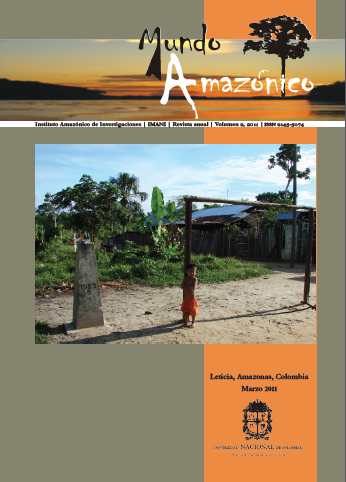Formación de cuerpo entre los tikuna: una aproximación intercultural a los conceptos de nutrición infantil
Intercultural Interpretations about Concepts of Nutrition: Body Formation among the Tikuna Indians of the Colombian Amazon Trapeze
Keywords:
Trapecio amazónico, tikuna, cuerpo, nutrición infantil, creencias alimentarias, dietas, antropometría. (es)Amazon Trapeze, Tikuna, body, child nutrition, food beliefs, diets, anthropometry. (en)
Downloads
Este artículo es una aproximación a las percepciones que los indígenas tikuna de San Martín de Amacayacu, en el sur del Trapecio amazónico colombiano, tienen sobre la formación del cuerpo infantil. Los conceptos indígenas sobre la nutrición no son equiparables a los conceptos sobre nutrición y desnutrición desde cuantificaciones biológicas. Para los nativos la formación del cuerpo se inicia desde los mitos de origen, el trabajo cotidiano, la relación con los seres de la naturaleza y los cuidados necesarios para los niños. Para los profesionales de la salud, en contraste, la concepción del cuerpo humano se fundamenta en una lógica biológica, nutricional y antropométrica. Este artículo muestra las diferencias entre estas dos visiones, por lo que es necesaria una reflexión intercultural para que puedan ser complementarias, ayudando a evitar muertes infantiles asociadas a deficiencias nutricionales.
This paper approaches the indigenous perceptions about the formation of an infant body by the Tikuna Indians of San Martin de Amacayacu, who live in the south of the Colombian Amazon Trapeze. Indigenous concepts about nutrition are not comparable with the concepts of nutrition and malnutrition from the perspective of biological quantification. For the natives, body formation initiates with their myths of origin, everyday subsistence activities, relationships with natural beings and the bestowal of care of infant babies and small children. For health professionals, in contrast, the conception of the human body is based upon a biological, nutritional and anthropometric logic. The article shows the differences between these two visions, calling for an intercultural rethinking to make them compatible in order to avoid infant deaths associated with nutritional deficiencies.
How to Cite
APA
ACM
ACS
ABNT
Chicago
Harvard
IEEE
MLA
Turabian
Vancouver
Download Citation
Article abstract page views
Downloads
License
Copyright (c) 2015 Ana María León Taborda

This work is licensed under a Creative Commons Attribution-NonCommercial-NoDerivatives 4.0 International License.
Authors are responsible of all the authorizations that the publication of their contributions may require. When the manuscript is accepted for publication, authors must send a formal declaration about the authenticity of the work, assuming personally the responsibility for all the contents of the article, and explicitely indicating their right to publish it. Publication of a contribution in Mundo Amazónico does not imply the cession of copyright by the authors; however, sending a contribution to this journal represents an authorization by the authors to the Editors of Mundo Amazónico to publish it. In case that the authors reprint, totally or partially, an article previously published in Mundo Amazónico, either in its original language or in translation, the original source must be cited. The articles published in the journal are covered by a Creative Commons 4.0.
The authors who publish in this magazine agree with the following terms:
- The authors retain the copyright and grant the magazine the right of the first publication, with the work simultaneously licensed under a Creative Commons Attribution License that allows others to share the work with the acknowledgment of authorship and the initial publication in this journal.
- Authors may make additional contractual arrangements for the non-exclusive distribution of the version published in the journal (for example, placing it in an institutional repository or publishing it in a book), with recognition of its initial publication in this journal.















